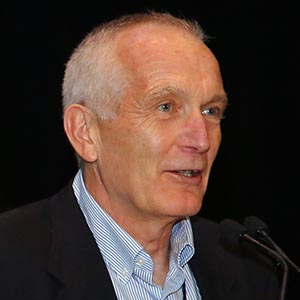Global Economic Growth & Agricultural Trade: Trade Panel
The symposium “Global Economic Growth and Agricultural Trade: Prospects, Policies, and Perspectives” was co-hosted by the Yeutter Institute and the Farm Foundation.

Richard Crowder
Most recently Richard served as Thornhill Professor of Agriculture Trade at Virginia Tech. He currently serves as an advisor to for-profit and not-for-profit organizations. He has served on the Board of Trustees of the Farm Foundation and on the boards of directors of other companies including Soo Line Railroad, Penford Corporation and Smithfield Foods. Most of his career has been in executive positions with such companies and organizations as the American Seed Trade Association, DEKALB Genetics Corporation, and the Pillsbury Company.
Richard served as the U.S. Chief Agriculture Negotiator from January 2006 to May 2007, with the rank of ambassador, where he was responsible for directing all U.S. agricultural trade negotiations around the world. He also served as a senior advisor to the United States Trade Representative from May 2007 to April 2008. From 1989 to 1992, he served as Under Secretary, International Affairs and Commodity Programs in USDA.

Darci Vetter
Ambassador Darci Vetter is general manager for public affairs and vice chair for food, agriculture and trade at Edelman, where she supports clients in the commodities, supply chain, agribusiness and global trade arenas.
From 2014-2017, Ambassador Vetter served as chief agricultural negotiator at the Office of the U.S. Trade Representative a Senate-confirmed Presidential Appointment with the rank of ambassador. In this role, she was responsible for bilateral and multilateral negotiations, including the Trans Pacific Partnership agricultural package, and significant bilateral negotiations with Japan, China, Brazil and other countries.
Ms. Vetter was the deputy under secretary of agriculture from 2010-2014, where she oversaw the Foreign Agricultural Service, led the department’s international trade negotiating team, directed USDA’s export assistance programs, and coordinated USDA's role in international food aid and trade capacity building.

Megan Provost
Megan Provost is the President of RISE (Responsible Industry for a Sound Environment), the national trade association representing manufacturers, formulators, distributors and other industry leaders in the specialty pesticides and fertilizer industry. Provost brings a strong background in national-level pesticide industry advocacy and non-profit leadership to the role.
At RISE, Provost is responsible for the overall active management and direction of the programs, activities, business operations, and other affairs of RISE. Working with the RISE Governing Board, the Provost is responsible for establishing strategic direction and setting annual priorities to meet the unique needs of the specialty pest management and fertilizer industries on a national, state and local level. RISE’s advocacy can take many forms, from interfacing with key decision and policymakers at all levels to engaging in grassroots activities in local communities. The association serves an industry comprised of eight major segments: aquatics, consumer, forestry, nursery and greenhouse, public health, structural pest control, turf and ornamental, and vegetation management.

John Beghin
John is a faculty fellow with the Daugherty Water for Food Global Institute at UNL and with the Center for Agricultural and Rural Development at Iowa State University.
Prior to joining UNL, John was a Professor of Agricultural and Resource Economics (ARE) at NC State University and Iowa State University. Beghin earned his MSc in agricultural economics at NC State and then received his Ph.D. from UC Berkeley in 1988. After returning to NC State for 10 years, Beghin went on to Iowa to serve as Director of the Food and Agricultural Policy Research Institute and Marlin Cole Professor of international agricultural economics at Iowa State University, from 1998 to 2016. Beghin returned to NC State in January 2017 and served as department head for 2 years.